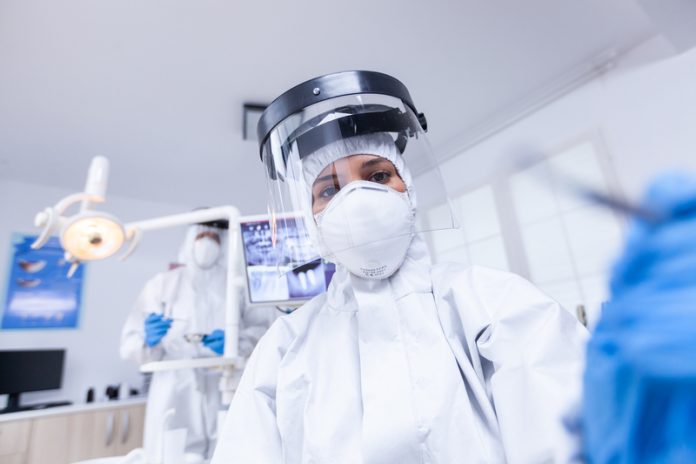Dr Ferruccio Berto, National Vice President and NLO for Foreign Affairs of the National Association of Italian Dentists, provides a dental industry perspective on the Italian approach to the COVID-19 pandemic
Italy was the first European country to bear the brunt of the COVID-19 pandemic. The national lockdown was proclaimed between March 9th and May 4th, 2020; a timely decision that helped to flatten the infection curve and prevent the national health system from a collapse that otherwise seemed inevitable. After that, a strategy based on contact tracing, mass testing and localised limitations was implemented to contain the virus; however, this plan’s partial success led to the progressive enforcement of regional lockdowns between late autumn and winter 2020.
Since the beginning of the pandemic, Italian dentists decided to limit themselves to urgent treatments and pain management procedures only, but dental offices never closed completely. This decision was motivated by the nature of Italian dentistry, almost entirely represented by the private sector, embodied by small practices evenly spread throughout the territory. Thus, patients were not abruptly deferred to public hospitals, which were already under profound pressure; a choice that meant limiting movements prevented further spread of the virus, and at the same time, allowed the health conditions of dental patients to be monitored more closely. (1)
Dentists facing the pandemic
Although we later discovered a longer latency period of SARS-CoV-2 within the national context (2), by the end of February 2020, the situation was perceived as dire and unpredictable. As reported by other national associations (3) at first, the emotional and psychological impact on dentists and patients was heavy. Nonetheless, the profession was able to work through the pandemic, consenting to the full reopening as soon as the lockdown ended. Although the situation is not entirely normal yet, national data shows how dental health did not deteriorate significantly during the lockdown. Emergency treatment and pain management hadn’t ever stopped, avoiding a build-up of aggravated patients with complex clinical conditions.
Since the beginning of the pandemic, ANDI (National Association of Italian Dentists) worked in connection with the National Chamber of Dentistry (CAO) and the Ministry of Health to coordinate the crisis approach. An official commission was soon established to answer dental health needs, provide safety measures for clinics, organise PPE bulk orders and distribution plus guide reopening. (4) The commission provided a controlled space for data circulation, confrontation and debate for different actors involved in oral care while avoiding the risks of disorganised interaction with media and other institutions.
One of the main goals was to further and support a progressive vision for dental medicine during the ongoing pandemic. As reported by different sources, (5) an initial inability to partake in a shared decision process to manage the pandemic emergency fostered a proliferation of unproven news about the low safety standards implemented by dental offices. Nowadays, numerous research projects have proved that dental offices are safe. The correct implementation of security measures, the careful management of antigenic testing and contact tracing, and the reorganisation of workflow are effective methods to minimise infection risk. (6) The data available to us confirms this trend.
Since February 2020, there has been no COVID-19 outbreak directly related to dental attendance. Less than 8% of the physicians who died of COVID-19 in Italy were dentists; more than half of them fell ill during the first two months of the pandemic when contact tracing was difficult and preventive measures were still in development. (7) Nonetheless, this prejudice helped to foster something we hoped to leave in the past: the image of oral health as a commodity or a privilege. Something that can be postponed without profound implications for general and individual well-being; an ancillary vision of dental health proved wrong and short-sightedness on numerous occasions, (8) sadly resurfaced during this crisis.
Dental care after the pandemic?
We have to ask ourselves what dentistry will look like in a COVID-free world and while may be hopeful about this, it’s still a premature thought. The real problem today is how to ensure universal oral health coverage through the still raging pandemic. Since February 2020, dental patients worldwide have had to endure common limitations that prevented free access to dental care. Moreover, data on the vaccination effort tells us that we will not reach global coverage swiftly, and the uncertain effect of SARS-CoV-2 mutations could delay the process even further. Therefore, we should not postpone oral health programmes to a normalised future but invest in them as tools to normalise our present.
As in many other European countries, Italian dentists are currently facing multiple challenges. The number of patients, although steadily rising, has not yet returned to normality; (9) apart from the aforementioned misinterpretations regarding the importance of oral health, this fact is directly relatable to the unemployment crisis that we currently face. This tendency manifests overtly in already underrepresented social groups: first-generation migrants, elderly patients and low-income families. If not effectively contrasted, this trend will lead to a decrease in preventive and restorative care, the cornerstone of a clinical approach proven to be highly efficient, aesthetically pleasing, and cost-effective for patients and healthcare providers alike. Moreover, by prioritising some forms of treatment over others, the pandemic is putting a dent in the holistic approach for medicine; a progressive and inclusive vision for the future of healthcare, aimed at the patient’s well-being intended as a whole, in which oral health finds its natural place. (10)
In conclusion, what we need now is a conscious and widely shared position that reinstates the importance of oral health as a fundamental component of general health and, therefore, that presses national and international organisations to promote and support this effort; so in this sense, 2021 has opened with renewed hope. (11) Now, we need a coherent action that develops these propositions into actual projects.
References
(1) Coronavirus Emergency Statement, first joint statement asking dentists to guarantee emergency treatment during the lockdown while following all security measures (March 8th, 2020).
(2) Unexpected detection of SARS-CoV-2 antibodies in the prepandemic period in Italy. It must be noted how, by the time national lockdown was proclaimed, the first confirmed COVID-19 case reported in Italy dated back only to January 30th.
(3) As in Coronavirus: Three things you can do for your mental wellbeing, British Dental Association; Maintaining mental health, wellness during COVID-19 pandemic, American Dental Association; also in The Mental Health Consequences of Coronavirus Disease 2019 Pandemic in Dentistry.
(4) The commission formed soon after the WHO declaration of pandemic risk and began to elaborate safety measures and guidelines to prevent the virus’s spread while organizing PPEs distribution. On April 10th, 2020, the commission was reorganized by ministerial decree. See Indicazioni operative per l’attività odontoiatrica durante la Fase 2 della pandemia di COVID-19.
(5) Dentistry and patient safety during the COVID-19 pandemic, Council of European Dentists; FDI World Dental Federation Statement.
(6) As in Aerosols modification with H2O2 reduces airborne contamination by dental handpieces.
(7) For a complete list of Italian medical casualties related to COVID 19, Elenco medici caduti nel corso dell’epidemia di COVID-19. Article’s data collection: February 7th, 2021.
(8) For a general overview, WHO Health Topic: Oral Health, and FDI Statement: Oral Health and Quality of Life.
(9) Data on this issue is not yet conclusive, and presents consistent contextual variables; however, we are estimating an average decrease of 30% in patients’ attendance.
(10) Since 2019, oral health has been included in UN Political Declaration Universal health coverage: moving together to build a healthier world.
(11) We are referring to the FDI Vision 2030 report, and to the Oral Health agenda (approved by the 148th session of WHO Executive Board.











